-
I have been suffering from a stiff neck for many years. What is this condition? Is it a disease?
-
Neck stiffness is caused by excessive tension in the muscle that supports back of head, and it becomes discomfort in neck.
Some of the discomforts caused by a stiff neck include stiffness, tension, fatigue, a feeling of being stuck, a sensation of something hard like a steel plate in the neck, and heaviness. It may also cause some pain.
In addition, these discomforts are so strong that they cause headache, nausea, vomiting, heaviness in the head, heaviness around the eyes, dizziness, pain in the nape, etc. Also, due to overstrain on the neck muscles, the range of motion of the neck becomes narrow, making it impossible to turn the head to the side or look back, so you need to turn your body around when someone calls your name,
Although these are painful symptoms, it has not really been recognized as a “disease” and there had been no specific medical treatment. Some conservative therapies we could take are acupuncture, moxibustion, massage and or adjusting pillow.
Recently, new treatment for neck stiffness has emerged that target the problematic blood vessels in the muscles and connective tissue. That treatment has a possibility to eliminate the discomfort around neck. Please also read the following pages for more information.
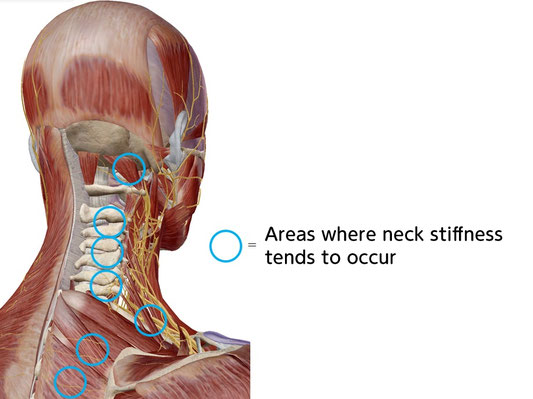
-
For the past few months, I have had stiffness in my neck and nape, so I had to take an MRI. There was no bone abnormality, and I was told that I have a straight neck. When it is severe, I sometimes have headaches and nausea. Are headaches and nausea also caused by stiff neck?
-
Headaches and nausea can appear due to stiffness in the neck, shoulders, or nape of the neck. If your headache and nausea are also worse when the stiffness is severe, then the stiffness in the neck is most likely the cause of these symptoms.
Of course, headache and nausea can also be caused by other illnesses, so it is necessary to check whether you have them or not. However, if no other cause is found and the symptoms worsen or improve in conjunction with the stiff neck symptoms, then you can say that stiff neck is the cause. In this case, it is important to treat the stiff neck to resolve the underlying headache and nausea.
-
What causes stiff neck?
-
The term "stiff neck" can be divided into five causes. One or more of these causes can lead to stiff neck.
The first cause of neck stiffness is a damage near the neck bone called the cervical vertebrae such as whiplash by a car accident, a hard blow to the head, or someone being on top of your neck, and the muscles around that damage have become stiffened accordingly.
The Second cause is a repetitive strain on the neck from poor posture such as due to working in front of PC all day long. As is often said, a human’s head including the skull and brain inside weights as much as a bowling ball. The muscles of the neck support the head with fine adjustment, but if the head is kept in a posture in which it sticks out forward, the neck muscles will be excessively strained all the time to adjust it.
You have probably seen a scene where a drunk person, unable to adjust the weight of his or her head, falls forward, to the side, or backward while sitting down. Especially when working on a computer or studying for a long time, this unconscious adjustment continues for a long time, and this puts a strain on the muscles, causing stiffness.
The third cause is due to changes in one’s constitution or hormonal balance. For example, the body constitution and hormonal balance change after the age of 40, or when going through menopause. Muscle tension can become high during such changes, which can cause strong neck stiffness. Many people, especially those who did not even realize any stiffness, became worse after the age of 40.
The fourth cause is age-related deformation of the cervical spine, a bone in the neck. Deformation of the bones and the joints causes inflammation to spill over into the surrounding muscles, resulting in stiffness.
The fifth cause is mental stress. This is briefly summarized in the next question.
The first four of these have one thing in common. That is abnormality in the blood vessels caused by chronic inflammation of body, which is triggered by injury, repetitive strain or hormonal imbalance or deformation.
When you hear the word “blood vessels,” you may be confused why it leads to stiffness. In fact, the human body make blood vessels along with nerves, and it causes chronic discomfort such as pain and stiffness. Because of this, an increase in problematic blood vessels in the neck area can cause stiffness that is difficult to heal. In recent years, it has been found that treating the problem blood vessels can improve neck stiffness. Please read below for more details.
-
Does stiff neck relate to stress?
-
Yes. There is a strong relation between neck stiffness and stress. One thing, we all tend to feel depressed when we are under emotional stress. When we are under pressure, it is known that changes in our brain activities may cause pain and stiffness in the neck or back area.
One of the symptoms of depression is back pain or stiffness around back bone. A reason why this happens is even when we normally spend our daily lives, there are very weak pain and stiffness signals from our neck and back bone. However, our brain ignores such weak signals as noises, technically it is called the descending inhibitory system. When we face strong stress and depressed, our brain produces less serotonin or noradrenaline and weakens the activity of ignoring the signals. This causes the body to feel stiffness and pain that it would not have felt before.
Another reason why stress can cause stiff neck is that the human body has poor posture when under stress. When we are depressed or feel nervous, we stoop and bend our back naturally, and it causes a stress on our neck muscle.
In addition, we are told that laughing and eating happily boosts the immune system and in fact, enjoying ourselves and laughing boosts the immune system and reduces inflammation in our own bodies. On the other hand, if we are unable to laugh, or if we are under pressure, our immunity is weakened, and our body becomes more prone to inflammation. A sore neck is one example. Symptoms vary from person to person, such as dermatitis (e.g., atopy) or gastroenteritis (e.g., stomachache).
-
What kind of symptoms does neck stiffness have?
-
Symptoms caused by neck stiffness are very diverse. The first is pain or discomfort that occurs in the nape of neck or the back of head. Some of the discomforts include feeling something hard is inside of neck, sticking, heaviness, and sometimes feeling like an insect is crawling on neck. Also, when you turn your head to the side, it stops at the certain angle, and you cannot move your head any further. This means that when someone calls for you to turn around, you have to turn your entire body to look back.
It also includes waking up with discomfort, decreased range of motion in neck, numbness from shoulders to arms, tingling in the fingers, muscle weakness, and decreased sensation in arms and shoulders. Headaches, nausea, eye fatigue, heaviness in head, dizziness, tiredness, and difficulty concentrating are also common symptoms of neck stiffness.
-
Are there any recommended stretches or exercises to relieve neck stiffness?
-
To reduce the strain on your neck, it is good to stretch and exercise the back and lower back below your neck. This is because softening the thoracic and lumbar vertebrae reduces the burden on the cervical vertebrae above them.
■Thoracic Spine Stretching
To stretch the thoracic spine, follow the steps below. While sitting on a chair, arch and stretch your back. During this stretch, be conscious of pulling the solar plexus backward or thrusting it forward to create movement of the thoracic spine (the spine at the level of the solar plexus).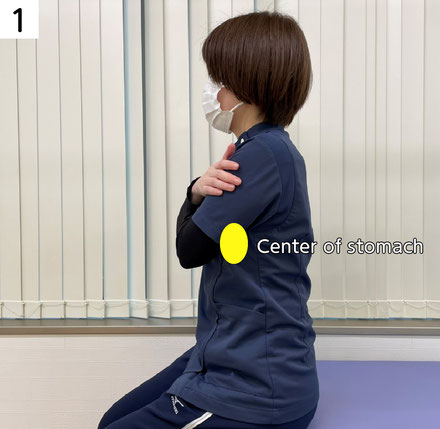
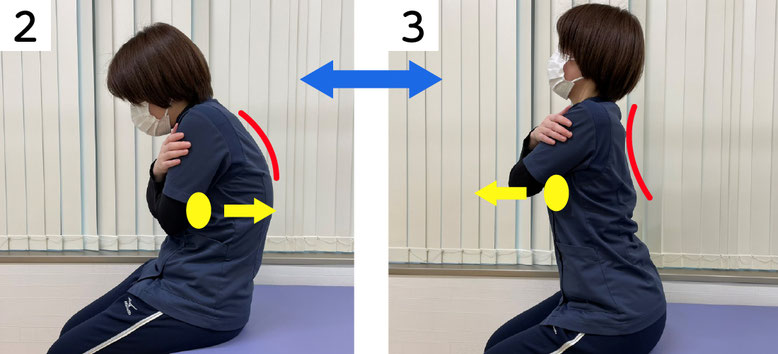
- Sit on a chair.
- Round your back so that your solar plexus is pulled back.
- Stretch your back so that your solar plexus moves forward.
- Repeat "2" and "3" slowly 10 times.
■Lumbar Spine Stretching
Stretch the lumbar spine as follows Lie on your back with both knees bent. Slowly roll both knees to the left and right. When you do this stretch, try to keep both shoulders off the floor as much as possible to get a better stretch feeling around the lumbar area.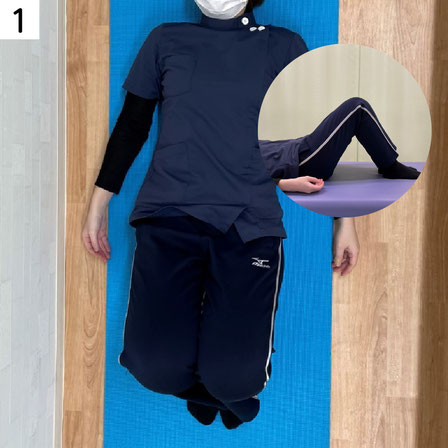
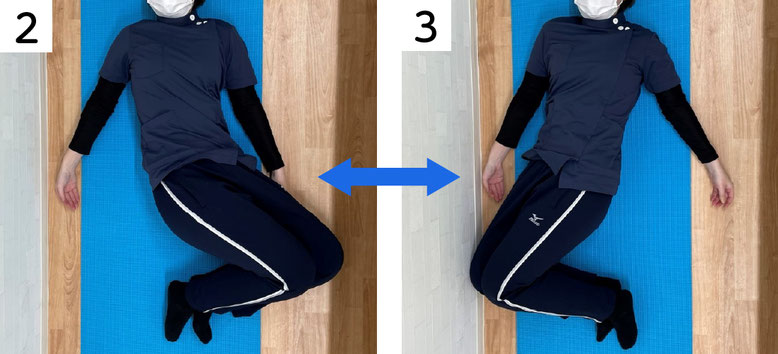
- Lie on your back with both knees bent.
- Keeping both knees bent, slowly roll to the left.
- Next, slowly topple to the right.
- Repeat "2" and "3" slowly 10 times.
The above two stretches should be done for 10 times with breathing slowly.
In addition, if the posture is such that the chin is forward, the strain on the neck muscles is increased and muscle tension is more likely to occur. Please refer to the following tips for exercises that are effective in relieving the strain on the neck muscles.
■Posture
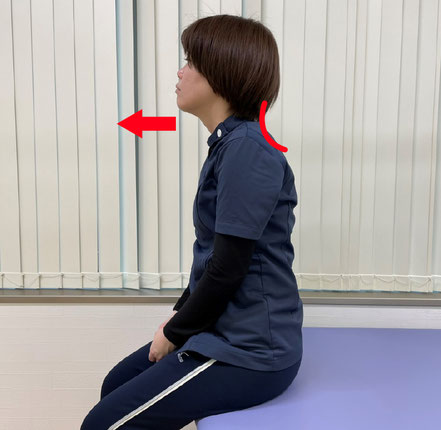
Posture in which the chin is forward
→More stress on the neck muscles
→Tension in muscle is more likely to occur■Neck Exercises
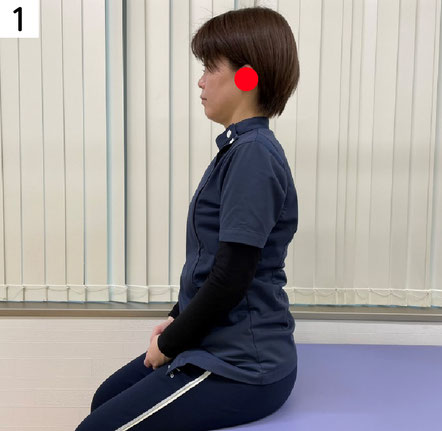
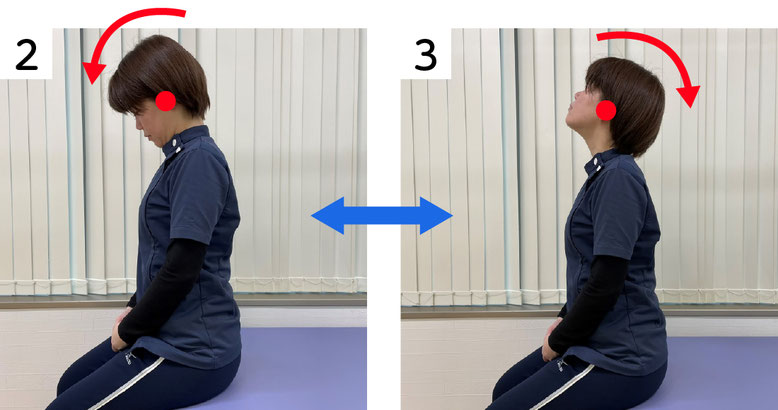
- Gently pull back the chin.
- Turn your head downward, thinking the ears as the axis (red ●).
- Turn upward in the same manner as "2".
- Slowly repeat "2" and "3" 10 times.
-
Are there any acupressure points or massages for neck stiffness?
-
Let us introduce one way to relieve neck stiffness. At the base of neck, press around the bumps below the back of the head, on both sided. Place your hands on the back of your head so that your hands are wrapped around your head and your thumbs are touching the back of your head. In this position, press them slowly with a little pain. It is better to press slowly for about 20 seconds rather than rubbing.
■Neck Massage1
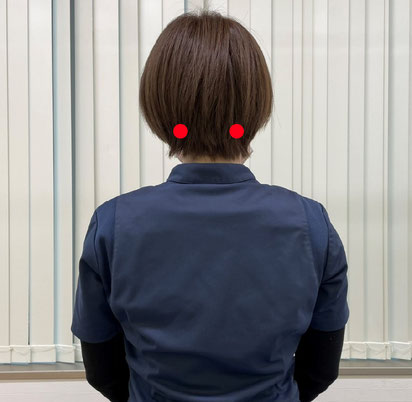
Please check the position of bumps (red ●) below the back of head.
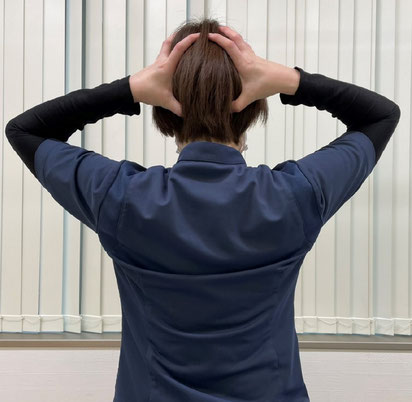
Wrap your head with both hands so that your thumbs touch the red ● area.
Press them slowly. You may feel a little pain but keep it not so uncomfortable level.
It is better to press slowly for about 20 seconds rather than rubbing.■Neck Massage2
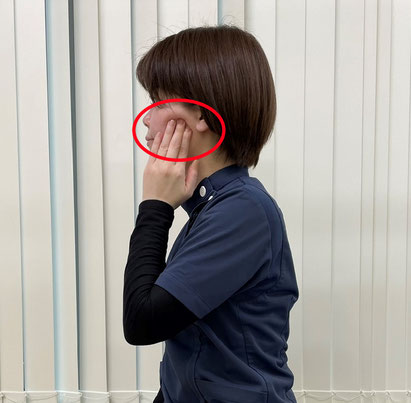
↑Jaw muscle massage Gently massage the chin with light pressure, placing your finger on the area where it moves when you open and close your mouth.
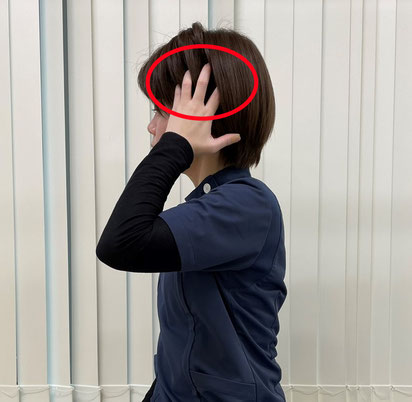
↑Temporal muscle massage Massage the area above and behind the ears with light pressure using your fingers. Imaging as if you were moving the scalp.
-
Are there any effective products to improve stiff neck?
-
One of the most effective goods for improving neck stiffness is to choose a pillow that suits you, such as the following.
It is best to make a pillow with an adjustable height that is appropriate for you.
How high is best depends on your age and the condition of your neck bones. A good rule of thumb is to lie on your back with your hands crossed in front of your chest, and with the pillow on your head, toss and turn from side to side. The pillow should be just the right height so that it is not too painful to turn over, and so that you can turn over smoothly without using the strength of your hands.To adjust a pillow of the ideal height as described above for an individual, it is convenient to make one by folding a bath towel or the like and adjusting its height.
We do not recommend commercially available pillows that have bulges on either side or that are concave at the head and slightly protrude at the neck. This makes it difficult to turn over in bed and puts strain on the neck.
-
Should I cool my stiff neck? or warm it up?
-
Neither is actually recommended as a treatment for neck stiffness. Cooling or warming often does not solve the problem, and both can cause excessive irritation, which can lead to extra sensitivity. The stretching mentioned above and acupressure on the discomfort area are considered better ways to take care of the problem by yourself.
-
I have a stiff neck. It improves temporarily with massage but comes back soon. Is there any way to treat it fundamentally?
-
Immediately after a strong rubbing of the discomfort area, the brain produces a substance that reacts to the rubbing stimulus. The substance makes it difficult to feel pain. This may seem to improve the pain and stiffness, but it is only temporary, and when the substance is gone (it will decrease in a few hours), it will return to previous condition. Also, after a strong massage, the strong irritation to the neck and shoulders can conversely worsen the inflammation and cause strong pain signals later. This would cause a terrible pain in the next day. Thus, a strong massage is not recommended. Massage does not solve the underlying cause.
The root cause of stiff neck, as mentioned above, can be injury from major trauma, repetitive strain, or hormonal imbalance, all of which can cause problem blood vessels to form near the neck bones. When problem blood vessels form in the muscles and connective tissue around the neck bones, the nerves increase with them, causing discomfort and pain.
Recently, it has been discovered that transcatheter artery embolization is available to safely reduce this abnormally formed blood vessel and improve the longstanding symptoms of stiff neck.
Author

-
I began my career as an interventional radiologist, which led to my research on pathological angiogenesis during graduate school. As first author, I published findings on related genes in Nature Medicine in 2012. Based on this work, I developed a novel embolization treatment for chronic musculoskeletal disorders, such as knee osteoarthritis and frozen shoulder, and was the first to report its safety and effectiveness. This approach is now being studied internationally.
-Career-
2006-2009 Fellow, Department of Radiology, Clinica ET, Yokohama, Japan
2009-2012 Researcher, Center for Integrated Medical Research, Keio University, Tokyo, Japan
2012-2015 Clinical Researcher, Department of interventional radiology, Edogawa Hospital, Tokyo, Japan
2015-2017 Director, Musculoskeletal Intervention Center, Edogawa Hospital, Tokyo, Japan
2017- Chief Director, Okuno Clinic., Tokyo, Japan
Latest posts
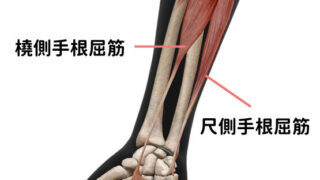 Jan 21, 2026Golfer’s Elbow
Jan 21, 2026Golfer’s Elbow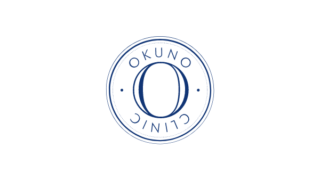 Sep 12, 2025Gout FAQ
Sep 12, 2025Gout FAQ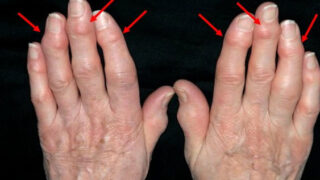 May 30, 2025Heberdens Nodes FAQ
May 30, 2025Heberdens Nodes FAQ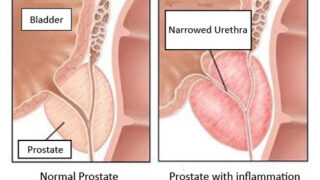 Dec 27, 2024Prostatitis FAQ
Dec 27, 2024Prostatitis FAQ